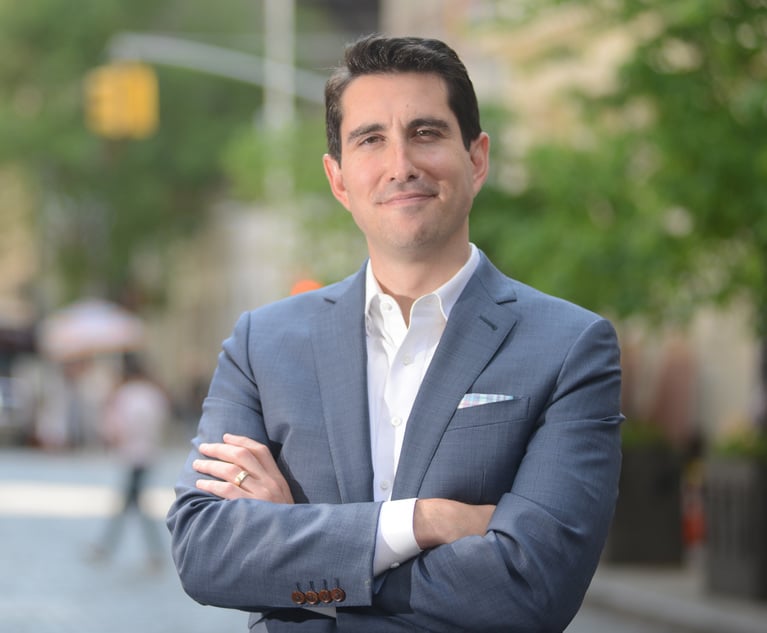Silicon Valley's In-House Hiring Takes Hit From High Cost of Living
Candidates for in-house legal jobs in Silicon Valley are turning down offers, citing the region's high cost of living as the reason for their decision.
June 24, 2019 at 05:19 PM
4 minute read
The original version of this story was published on The Recorder
 San Francisco's Golden Gate Bridge/Credit: canadastock/Shutterstock.com
San Francisco's Golden Gate Bridge/Credit: canadastock/Shutterstock.com
The rent is too damn high in Silicon Valley—and it's driving off in-house candidates.
Bay Area legal recruiters said it has become increasingly common for in-house candidates at all levels to turn down offers in Silicon Valley, explicitly citing “cost of living” as the reason for their decision. The shrinking pool of available candidates coupled with growing demand for in-house counsel is keeping positions open in the region for longer than usual.
“I've had candidates not be able to accept assignments because of the cost of living here. And that's what they say, 'cost of living.' I think it's a very common term now that I'm hearing more regularly,” said Elisabetta Fabiani, a legal recruiter and Silicon Valley branch director of staffing firm Robert Half International.
She's seen the biggest impact on legal department support staff hiring in towns such as Facebook's home base Menlo Park and neighboring Palo Alto, where Tesla Inc. and Hewlett Packard Enterprise are located. The average home price in either town is more than $2 million, according to Zillow.
The average pay for in-house support employee—administrators, file clerks and secretaries—is under $60,000, according to Robert Half's 2019 salary guide.
That's left support staff candidates, many of whom Fabiani said live further south in San Jose, with a tough choice: take the job and a possible two-hour round-trip commute, or waive the offer for a position closer to affordable housing.
“We have candidates simply turning down jobs based on location,” Fabiani said. “They don't even wait to hear the pay, to hear about the job. The minute I tell them the job's in Menlo Park or the job's in Palo Alto, they politely decline. Which is very different from seven years ago.”
Lawyers in-house are left to pick up the administrative work that needs to be done as job openings linger unfilled for weeks, sometimes months, longer than usual, she said. Legal departments have begun introducing hybrid roles, merging paralegal positions with support responsibilities to offset the lack of administrative staff.
Carol Warren Simon, a managing director at legal recruiting firm Major, Lindsey & Africa's San Francisco in-house practice group, said she's seen legal departments struggle to attract nonlocal candidates for “mid- and lower-level attorney roles” with five to 10 years of experience.
Candidates have explicitly told her, too, that “cost of living” is their reason for turning jobs down. That's a shift from when she started in legal recruiting around five years ago.
“Candidates from other parts of the country were more often than not very eager to come to the Bay Area. Yes, it's expensive, but it's where it's happening, it's exciting, it's beautiful. Everybody seemed to want to come here,” Simon said. “But in the last year or so I'm hearing much more hesitancy about it.”
The “veneer has gotten a little thin as far as the Bay Area goes,” she said, speculating it's in part due to increased media coverage of rising costs and wealth inequality in the region.
General counsel hiring hasn't been unaffected. While GCs and chief legal officers are the top paid earners in their department, that's true in any city. Fabiani said she's seen GC roles stay open longer than usual, sometimes more than six months, with candidates concerned over the high cost of living.
Legal execs might be offered a high compensation to lead a legal team in Silicon Valley, but, Simon noted, “that package doesn't go as far in the Bay Area as it might in other parts of the country.” She's seen increased competition from states such as Texas, where taxes, commute times and home prices are often lower.
Bay Area companies are changing the way they hire legal talent in response. Simon said she's seen a slight shift in focus on hiring local attorneys who don't have to move for the position.
There is also an increased emphasis on noncompensation perks: mentorship, career development and a powerful company mission. While Silicon Valley is expensive, it's also still a hotbed of tech startups and talent, Simon and Fabiani said. That's a big plus for some lawyers.
“The Bay Area has remained a leader in innovative companies, innovative technologies of all kinds. That continues to be a huge draw that employers will certainly emphasize,” Simon said. “Even if they can't pay the same compensation … they are inventing tomorrow's technology.”
This content has been archived. It is available through our partners, LexisNexis® and Bloomberg Law.
To view this content, please continue to their sites.
Not a Lexis Subscriber?
Subscribe Now
Not a Bloomberg Law Subscriber?
Subscribe Now
NOT FOR REPRINT
© 2025 ALM Global, LLC, All Rights Reserved. Request academic re-use from www.copyright.com. All other uses, submit a request to [email protected]. For more information visit Asset & Logo Licensing.
You Might Like
View All
Kraken’s Chief Legal Officer Exits, Eyes Role in Trump Administration
3 minute read

Litigation Involving Failed Banks: What Litigators and In-House Counsel Should Be Thinking About
5 minute read
Coinbase CLO Paul Grewal Blasts SEC for 'Enforcement-First' Crypto Crackdown
Trending Stories
- 1How Alzheimer’s and Other Cognitive Diseases Affect Guardianship, POAs and Estate Planning
- 2How Lower Courts Are Interpreting Justices' Decision in 'Muldrow v. City of St. Louis'
- 3Phantom Income/Retained Earnings and the Potential for Inflated Support
- 4Should a Financially Dependent Child Who Rejects One Parent Still Be Emancipated?
- 5Advising Clients on Special Needs Trusts
Who Got The Work
J. Brugh Lower of Gibbons has entered an appearance for industrial equipment supplier Devco Corporation in a pending trademark infringement lawsuit. The suit, accusing the defendant of selling knock-off Graco products, was filed Dec. 18 in New Jersey District Court by Rivkin Radler on behalf of Graco Inc. and Graco Minnesota. The case, assigned to U.S. District Judge Zahid N. Quraishi, is 3:24-cv-11294, Graco Inc. et al v. Devco Corporation.
Who Got The Work
Rebecca Maller-Stein and Kent A. Yalowitz of Arnold & Porter Kaye Scholer have entered their appearances for Hanaco Venture Capital and its executives, Lior Prosor and David Frankel, in a pending securities lawsuit. The action, filed on Dec. 24 in New York Southern District Court by Zell, Aron & Co. on behalf of Goldeneye Advisors, accuses the defendants of negligently and fraudulently managing the plaintiff's $1 million investment. The case, assigned to U.S. District Judge Vernon S. Broderick, is 1:24-cv-09918, Goldeneye Advisors, LLC v. Hanaco Venture Capital, Ltd. et al.
Who Got The Work
Attorneys from A&O Shearman has stepped in as defense counsel for Toronto-Dominion Bank and other defendants in a pending securities class action. The suit, filed Dec. 11 in New York Southern District Court by Bleichmar Fonti & Auld, accuses the defendants of concealing the bank's 'pervasive' deficiencies in regards to its compliance with the Bank Secrecy Act and the quality of its anti-money laundering controls. The case, assigned to U.S. District Judge Arun Subramanian, is 1:24-cv-09445, Gonzalez v. The Toronto-Dominion Bank et al.
Who Got The Work
Crown Castle International, a Pennsylvania company providing shared communications infrastructure, has turned to Luke D. Wolf of Gordon Rees Scully Mansukhani to fend off a pending breach-of-contract lawsuit. The court action, filed Nov. 25 in Michigan Eastern District Court by Hooper Hathaway PC on behalf of The Town Residences LLC, accuses Crown Castle of failing to transfer approximately $30,000 in utility payments from T-Mobile in breach of a roof-top lease and assignment agreement. The case, assigned to U.S. District Judge Susan K. Declercq, is 2:24-cv-13131, The Town Residences LLC v. T-Mobile US, Inc. et al.
Who Got The Work
Wilfred P. Coronato and Daniel M. Schwartz of McCarter & English have stepped in as defense counsel to Electrolux Home Products Inc. in a pending product liability lawsuit. The court action, filed Nov. 26 in New York Eastern District Court by Poulos Lopiccolo PC and Nagel Rice LLP on behalf of David Stern, alleges that the defendant's refrigerators’ drawers and shelving repeatedly break and fall apart within months after purchase. The case, assigned to U.S. District Judge Joan M. Azrack, is 2:24-cv-08204, Stern v. Electrolux Home Products, Inc.
Featured Firms
Law Offices of Gary Martin Hays & Associates, P.C.
(470) 294-1674
Law Offices of Mark E. Salomone
(857) 444-6468
Smith & Hassler
(713) 739-1250








